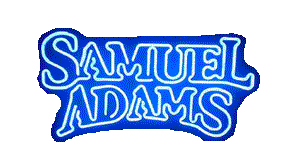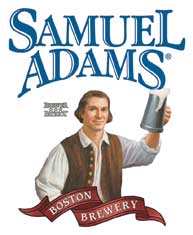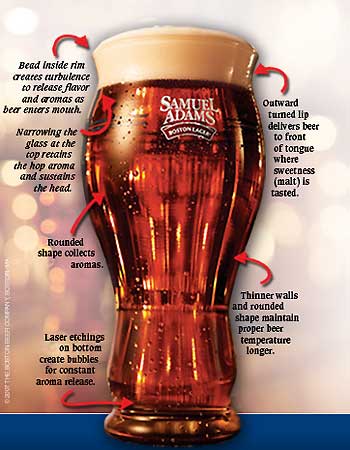Samuel Adams - Battling with the big guys

Below is an article about the Business side of Samuel Adams Brewery (Boston Beer Company). This market analysis was made before the announcement of the Coors/Miller merger. It's interesting to see a former Microbrewery battling with the big guys....
Sean
Drink Craft Beer, You've Earned It!!
P.s. I added extra pictures for those who might find this rather boring.
Small-Cap Spotlight: At Lagerheads Over Boston Beer
By Frank Curzio and Larsen Kusick
TheStreet.com Research Analysts
9/27/2007 12:07 PM EDT
URL:
http://www.thestreet.com/newsanalysis/small-cap-stock-spotlight/10381658.html
This week, the Small-Cap Spotlight evaluates beermaker Boston Beer (SAM) , which is best known for its Samuel Adams brand. The company offers investors a small-cap alternative to beer giants like Anheuser-Busch (BUD) , Miller Brewing, which is part of SABMiller, and Molson Coors Brewing (TAP) . Larsen Kusick says it's time for another round from this growth play, while Frank Curzio reminds readers to invest responsibly.

Kusick: A Heady Brew
Small-cap investing is often about betting on the little guy. Boston Beer is perhaps the best example of why small-cap investing makes sense, as the company has thrived for more than 20 years without losing its underdog status relative to Anheuser-Busch and its fellow beer behemoths. Today, Boston Beer stands out for its solid brand recognition and position as a leader in offering consumers a higher-quality beer.
You've probably seen Jim Koch (pronounced "Cook") in his commercials, smelling hops or drinking a beer alongside employees. His laid-back demeanor seems strange for a company chairman, and his voice, which I would euphemistically describe as "unpolished," makes his commercials stand out even more.
I have to admit that I was pleasantly surprised to find out that he's a Harvard grad (both undergrad and MBA) who left a successful career in manufacturing consulting to start Boston Beer in the mid-1980s.
Since then, the company has outgrown its microbrewery roots and in 2006 reported annual sales of more than 1.6 million barrels of beer. More importantly, revenue and earnings are both hitting double-digit growth rates, up 20% and 26%, respectively, in 2006. Analysts see continuing growth for Boston Beer, with consensus earnings estimates showing a 35% jump in 2007.
I see shares of Boston Beer as attractive because they offer the best of both small-cap and large-cap qualities. Sam Adams is an established brand with commercials that stand out (enough to be parodied on Chappelle's Show and Family Guy). These are characteristics one would expect from a much larger company, yet the brand represents just half of 1% of the domestic beer market, leaving Boston Beer with the large room for growth typical of a small-cap company.
Investors should note two keys that will drive the company's success. First, the company has a strong brand and competitive position in the domestic beer market.
Second, Boston Beer has the advantage in terms of product quality. As the former "little guy" that has developed brand recognition that rivals larger competitors, Sam Adams is poised to gain market share from both smaller and larger rivals.
Many of the small microbreweries that have sprung up over the past decade (following the success of Boston Beer) are unable to gain the following necessary to create a sustainable business. Scale is obviously a major factor in this. The bigger you are, the more profitable you are.
Meanwhile, the Sam Adams brand is consistently portrayed as a "step up" for drinkers of traditional American lagers like Budweiser, Coors and Miller, along with the "light" version that accompanies each. Not only the brand, but the product itself is clearly differentiable from the other three beers.
Put a pint of each on the table and everyone can pick out the Sam Adams just by sight. And I'd venture that there are a lot of people (especially those who don't claim loyalty to a particular brand) out there who would have a hard time differentiating between Bud, Coors and Miller by taste. Despite its ability to stand out among lagers, Sam Adams remains a truer substitute than a product like Guinness.
My point isn't that everyone in the U.S. is destined to make the switch to Sam Adams. Far from it. Every lager benefits from tremendous brand loyalty, making it extremely difficult to get many beer drinkers to switch from their personal favorite. My point is that Boston Beer has a lot of room to capture market share from these other brands.
Sam Adams could easily steal just a small amount of each brand's sales and it would double its U.S. market share. Another factor working in the brand's favor is that consumers move up-market to a much greater degree than they move down, meaning that a drinker of Miller Lite (for example) is much more likely to switch to Sam Adams than for the opposite to occur.
Turning to the stock, Boston Beer sports a price-to-earnings ratio of 27 times 2007 consensus estimates, which is a significant premium to the P/E ratios of Anheuser Busch and Molson Coors, which trade for 18 and 19 times 2007 estimates, respectively.
In this case I'm willing to pay up for Boston Beer because of the company's higher growth rate and larger opportunity for market share gains. This isn't to say that these larger players aren't also attractive, but their growth profiles are tied to international opportunities, which could eventually become a major catalyst for Boston Beer further down the road.
Investors should keep an eye on the company's plans for expansion. One of the reasons for the stock's strong performance this summer is management's apparent decision to postpone the construction of a new brewery in Massachusetts in favor of purchasing an existing brewery in Lehigh, Pa., from Diageo (DEO) .
Continuing strong demand will eventually force Boston Beer to construct a brand new facility, which would result in a big hit to near-term earnings once construction begins, but the investment would be a long-term positive for the company.
It bears noting that the purchase of the Pennsylvania plant means investors should pay attention to the renovation costs, likely to appear when fourth-quarter results are announced later this year.
On the positive side, shareholders also could benefit from increased analyst coverage of Boston Beer. Currently the company is only followed by two major investment banks, Goldman Sachs and Deutsche Bank, which both have hold ratings on the stock in part due to the uncertainty regarding the construction of a new brewery. Obviously, an upgrade from either would also likely generate a nice pop for investors.

Curzio: Valuation Is Key Concern
Larsen cites good reasons for why Boston Beer can be a formidable competitor to the alcohol beverage giants -- although I disagree that most people believe that Bud, Coors and Miller taste the same. But while I appreciate a good beer as much as anyone, we're looking at the stock, and this one has too much head.
Boston Beer's forward valuation is very high, and short-term production problems could lead to an earnings miss in the coming quarters.
Looking at valuation a bit more closely, earnings growth over the past year grew by 35%. But that is expected to slow to just 10% in 2008, and 13% the year after that, according to Thomson First Call. These estimates are relatively in line with the industry average of 11%, making that 27 times earnings for 2007 expensive based on expected growth trends.
Boston Beer will likely save at least $100 million through its expected deal with Diageo -- because it was contemplating opening up a new brewing facility that analysts estimated could cost about $200 million. But renovations and upgrades could add $30 million to $40 million to the $55 million purchase price and production will likely be delayed for months after this deal is closed.
Management already expressed production concerns last month, stating that its Cincinnati plant needs upgrades because it's been running 24/7 to meet huge demand. If demand can't be met, this could put a further dent in growth projections, which is certain to lead to a lower stock price in the short term.
Its Twisted Tea brand is also struggling as new competitors are entering this market at a torrid pace. Management stated in August: "Twisted Tea brand depletions declined slightly in a very competitive environment."

While this brand is small compared to its Sam Adams line, management cited in its annual report back in March that its 18.2% increase in annual volume was due to Sam Adams and the Twisted Tea family.
It's easy to jump on the Boston Beer bandwagon. After all, the company increased earnings by more than 30% year over year, shares climbed nearly 50% since May, and company found and chairman Jim Koch's charismatic demeanor is appealing to the average drinking crowd.
But further production problems could lead to an earnings miss, and that may not be taken well by holders of a stock that is trading at a very high premium compared to its peers. After this nice run-up over the past four months, I think it's time to ring the register.



0 Comments:
Post a Comment
<< Home